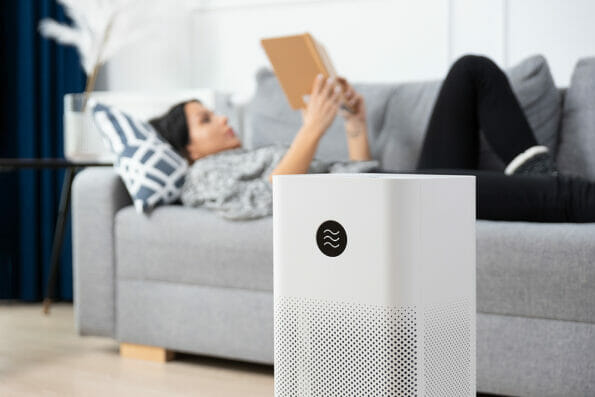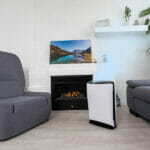With the ever-growing benefits of air purifiers, it is no wonder that they are becoming increasingly popular in homes and offices. They improve the quality of the air you breathe and significantly reduce airborne contaminants, making our day-to-day lives much healthier. An air purifier filters harmful particles, including dust, pollen, pet dander, mold spores, smoke, bacteria, and viruses. Air purifiers come in various sizes, ranging from miniature portable versions that can be used around the home or office to larger whole-house systems.
Using an air purifier can help reduce respiratory problems such as allergies and asthma by removing environmental allergens and pollutants. It can also improve indoor air quality by reducing unpleasant odors and helping alleviate symptoms of sick building syndrome (SBS) caused by chemical pollutants in the indoor air.
Air purifiers can be particularly beneficial for those who suffer from allergies or even asthma, as they help reduce the number of allergens and particles in the atmosphere. Removing these irritants reduces the symptoms associated with allergies and asthma, such as coughing, sneezing, and wheezing. In addition, the particulates that are removed from the air can provide relief from other conditions like sinus infections and headaches.
In terms of air quality, an air purifier can remove a wide range of airborne contaminants, including smoke, dust mites, and pet dander, that can increase respiratory illnesses and other health conditions. Air purifiers also reduce levels of volatile organic compounds (VOCs) and other toxic chemicals, helping reduce the risk of cancer and other illnesses.
Air purifiers with HEPA filters are especially effective at removing particles from the air. They have a high-efficiency rate of capturing almost all particles, including pollen, dust mites, pet dander, and mold spores.
Other air purifiers use activated carbon filters which absorb odors and VOCs or ionizers, which electrically charge particles so that they can be collected on an oppositely charged surface such as metal plates or blades.
In addition to improving air quality and reducing health risks, using an air purifier can also help reduce energy costs because air purifiers remove particles, resulting in colder and cleaner air that does not need to be cooled or heated as much. As a result, there is less strain on the HVAC system, which can lead to lower energy bills.
Although air purifiers are designed to improve indoor air quality and reduce airborne contaminants, it is essential to note that they will not eliminate all atmospheric pollutants. Air purifiers should be used with other methods, such as proper ventilation and regular cleaning and maintenance of heating and cooling systems.
How to choose the best air purifier for your home
When shopping for an air purifier, it’s essential to consider the size of the room you need to cover and your budget. Smaller rooms may only require a portable air purifier, while larger spaces require more powerful models. When choosing an air purifier, look for one with HEPA filters and features activated carbon or other filtration methods such as ionizers or ultraviolet (UV) light technology.
The type of filter used is essential, too; HEPA filters are great for capturing particles down to 0.3 microns in size but will not remove odors or VOCs as activated carbon does. Consider adding an odor-control filter and a particle filter if you have pets or smoke indoors. Additionally, some newer models offer different technologies, such as germicidal UV lamps, which can help reduce bacteria and viruses from circulating in the air.

It’s also important to consider noise levels when buying an air purifier since higher fan speeds often mean louder noises that could be annoying during sleep hours or while watching television in your living room. Most manufacturers provide good ratings on their products so you can better understand how loud they may be operating at different speeds and levels.
When using an air purifier, keep all the doors and windows closed to stop outside air from entering and undoing the cleaner’s work. Additionally, replace filters according to the manufacturer’s instructions; most HEPA filters must be replaced every three to six months, while activated carbon filters can last up to a year or longer. Regularly cleaning your air purifier’s housing unit and other parts will also help extend its lifespan and keep it working effectively. Find out more about air purifiers at theozonehole.com.
The bottom line
Using an air purifier has numerous benefits for your home or office environment. It can reduce allergens and other environmental pollutants, improve air quality and reduce symptoms of respiratory illnesses. It can also help reduce energy costs due to its improved cooling and heating efficiency. Air purifiers ensure the air in your home or office is clean and free of harmful particles.
Image Source: BigStockPhoto.com (Licensed)
Related Categories: Health, Home, Reviews







